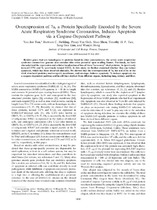Overexpression of 7a, a Protein Specifically Encoded by the Severe Acute Respiratory Syndrome Coronavirus, Induces Apoptosis via a Caspase-Dependent Pathway

View/
Date
2004Author
Tan, Yee-Joo
Fielding, Burtram C.
Goh, Phuay-Yee
Shen, Shuo
Tan, Timothy H.P.
Lim, Seng Gee
Hong, Wanjin
Metadata
Show full item recordAbstract
Besides genes that are homologous to proteins found in other coronaviruses, the severe acute respiratory
syndrome coronavirus genome also contains nine other potential open reading frames. Previously, we have
characterized the expression and cellular localization of two of these “accessory” viral proteins, 3a (previously
termed U274) and 7a (previously termed U122). In this study, we further examined whether they can induce
apoptosis, which has been observed clinically. We showed that the overexpression of 7a, but not of 3a or the
viral structural proteins, nucleocapsid, membrane, and envelope, induces apoptosis. 7a induces apoptosis via
a caspase-dependent pathway and in cell lines derived from different organs, including lung, kidney, and liver.
